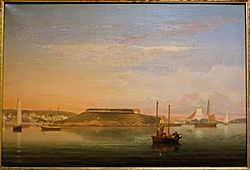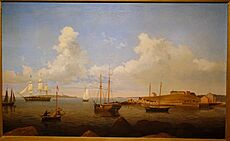Fort Defiance (Massachusetts) facts for kids
Quick facts for kids Fort Defiance/Fort Lillie/Fort at Gloucester |
|
|---|---|
| Fort Point, Gloucester, Massachusetts | |

Watch House Point, 1860 painting of Fort Defiance by Fitz Henry Lane
|
|
|
Location in Massachusetts
|
|
| Coordinates | 42°36′31.32″N 70°39′50.49″W / 42.6087000°N 70.6640250°W |
| Type | Coastal defense |
| Site information | |
| Condition | demolished |
| Site history | |
| Built | 1794 |
| Built by | Stephen Rochefontaine and John Lillie |
| In use | circa 1794–1865 |
| Materials | masonry, earthworks |
| Demolished | after 1865 |
| Battles/wars | War of 1812 American Civil War |
Fort Defiance was a historic fort located on Fort Point in Gloucester, Massachusetts. It was built to protect the inner harbor, which was also known as Watch House Point. The fort was used from 1794 until sometime after 1865.
Contents
Discover Fort Defiance: A Historic Massachusetts Fort
Fort Defiance played an important role in protecting the coast of Massachusetts. It was one of many forts built to defend American shores. Today, nothing remains of the original structure.
Why Was Fort Defiance Built?
Before Fort Defiance, other defenses stood on Watch House Point. These early forts were built to protect the area during different wars.
Early Defenses: Fort Anne and More
The British built a fort called Fort Anne on Watch House Point in 1703. This was during Queen Anne's War. It was rebuilt in 1743 for King George's War. This rebuilt fort might have been called Fort Libby.
During the American Revolutionary War, a simple defensive wall, called a breastwork, was set up at the same spot. These early structures showed how important this location was for defense.
Building a New Fort: The First System
In 1794, the United States government decided to build new forts along its coast. This was part of a plan called the "first system of U.S. fortifications." The town leaders of Gloucester asked for Fort Anne to be rebuilt.
The new fort was built under the guidance of Stephen Rochefontaine. He was a French military engineer who had helped in the Revolutionary War. Major John Lillie, a former officer, also helped. Some people believe the fort was named Fort Lillie after him. The official name was Fort at Gloucester.
The plan was to have eight large cannons, called seacoast guns. These would be placed in a separate strong area, or citadel. However, the government stopped sending money after 1795. So, it's not clear how much of the original plan was finished.
Fort Defiance Through the Years: Wars and Changes
Fort Defiance saw several upgrades and changes over its lifetime. It was used during major conflicts like the War of 1812 and the American Civil War.
The War of 1812 and a New Name
Around 1807, the fort was likely improved. This was part of the "second system of U.S. fortifications." Reports from 1808 mentioned that the "old fort of stone" had been repaired. By 1811, it had an enclosed battery with seven guns. It was also protected by a blockhouse, a small, strong building.
In 1814, during the War of 1812, the fort was officially renamed Fort Defiance. After this war, the fort was no longer actively used. It was put into "caretaker status," meaning someone looked after it. However, this caretaker was later removed.
Later Years and Disappearance
Sadly, vandals burned the fort in 1833. But it was rebuilt in 1851. A painting from 1860 by Fitz Henry Lane, called Watch House Point, shows the fort with stone walls and earth on top.
During the American Civil War, soldiers were stationed at Fort Defiance. It's possible more weapons were added then. After the Civil War, the fort was abandoned. The land remained under federal control until the 1920s. It's not known exactly when the fort was torn down. Today, no parts of Fort Defiance remain.
 | Ernest Everett Just |
 | Mary Jackson |
 | Emmett Chappelle |
 | Marie Maynard Daly |




